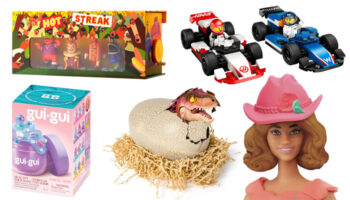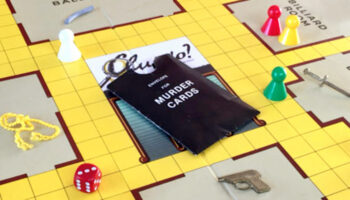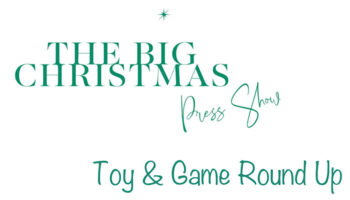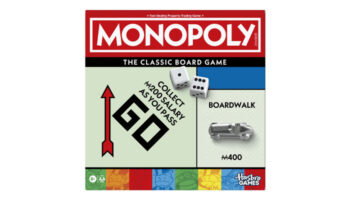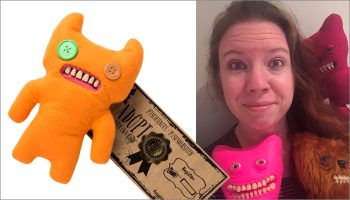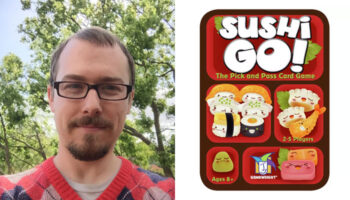Talking Games: Will Wordle’s popularity have a knock-on effect in the board game space? And what’s key to creating great word games?

Everyone, it seems, is playing Wordle.
The online daily word puzzle has properly taken off in recent months, and while its creator, software engineer Josh Wardle, has said he’s not interested in monetising the game, that hasn’t stop others jumping on its popularity… Etsy has plenty of Wordle-inspired mugs, cards and t-shirts if you’re interested.
But will the popularity of Wordle have an impact on the board game space? Will we see a spike in inventors pitching word games? And what is the key to a great word game?
We asked PlayMonster’s Adam Hocherman, creative consultant Deej Johnson, Heayes Design’s Richard Heayes, Bananagrams’ Rena Nathanson and Rudell Design’s Elliot Rudell for their thoughts on Wordle and its potential impact on our industry.
 Adam Hocherman,
Adam Hocherman,
Vice President, New Business, PlayMonster
“Is Wordle a fad? Absolutely. Nothing that has moved as quickly into the popular lexicon, let alone a brainy word game, could be considered otherwise. But why? Is there something particularly special, new or unique about the game that has made it catch fire so quickly? Yes and no.
The mechanic is not new. I hadn’t played the game Mastermind for 35 years, but Wordle immediately evoked this game from my youth. Upon revisiting Mastermind, I found that Wordle is, in fact, the very same game, albeit with five-letter words rather than a four-colour code. But most games are evolutions of games that came before and Wordle is, without question, an improvement on Mastermind. Words are fun, less abstract, and arguably more accessible.
I think what has made Wordle successful is that it has found a sweet spot between brainless subway entertainment (a la certain mobile hits) and brainy NY Times-type puzzles such as the Mini Crossword or KenKen. It’s neither too easy nor too hard. So, it may be a fad but the fad appears to be rooted in a sound gameplay foundation.
So, the next question to answer is whether or not there is a path to a successful boxed version of the game, or other games that are inspired by Wordle but that don’t necessarily use the brand directly. A word-game renaissance at the mass market? I highly doubt that, but I do believe that if the core mechanic of Mastermind/Wordle is rethought again in this context, perhaps with additional innovation, there could be an evergreen hit in here.”
 Deej Johnson,
Deej Johnson,
Creative Consultant and Writer
“HEART. There’s a five-letter word: you could start your Wordle guesses with that… No letters? Alright. Try LOGIC. Okay; now we’re getting somewhere!
Despite its popularity, I can’t see Wordle – in its current form – having a significant effect on board games. And the reason I say that directly relates to the different play experiences of logic and heart…
The way I see it, Wordle isn’t really a word game. It’s a logic puzzle! And while it does look like a game, it’s not actually all that playful. Rather, it’s about probability, letter frequency and pattern recognition. It’s about you, on your own, applying logic to an online diversion.
To some extent, that’s the antithesis of word-based board games. Titles like Scrabble, Bananagrams and Upwords work well because they engage people’s hearts as well as their brains… They’re about connecting and competing; about badgering and bantering; strategy and striving. And oddly enough, it’s this balance, this ratio of heart over logic, that – to me – is now the secret of creating a great word game. Wordle doesn’t have that any more than a crossword does; I can’t imagine its fans clamouring to play dissimilar games offline. That said, I’d love to be wrong!”
 Richard Heayes,
Richard Heayes,
Founder, Heayes Design & PlayLenz
“I’ve got back into word games recently. I still love Boggle, but word games do tend to work well digitally. Wordscapes has kept me busy lately, as has the daily ritual of Wordle. Word games make for a great daily dose of gaming. I think the key things that make Wordle great are, the easy of entry – no app – and the basic gameplay, which is Mastermind with letters. The other great elements are that it only takes a couple of minutes to play and the once-a-day routine makes it a great way to take a break, especially given many people are still working at home. It has become, for many, a way to have a game break with work colleagues and the easy sharing element brings new players in.”
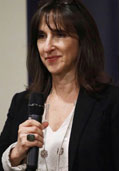 Rena Nathanson,
Rena Nathanson,
Top Banana, Bananagrams
“Wordle is a clever activity, and I can see why it’s taken off. Puzzling a word out of thin air is challenging, sometimes infuriating, but rewarding… If you can guess the word! I have had good and bad luck with it. Well, luck may not have much to do with it as it’s pretty cognitive, so I can only get frustrated with myself! I think Wordle will be around for a while, as its simplicity is addictive; the best games are. To try to beat one’s own score taps into the human nature of natural gamers – and can make gamers out of those who initially don’t like word games! Well done team Wordle!”
 Elliot Rudell,
Elliot Rudell,
Founder, Rudell Design and Inventor of Upwards
“Wordle reminds me of games I’ve played in the past, but it’s a phenom right now and has put a real spotlight on digital word games, and we’re happy about that – the numbers on the app version of Upwords are spiking right now!
That said, in my opinion (as a word game addict), Wordle’s once a day thing can be frustrating. There was a digital game app out a few years ago called Five Letters. It was a game about guessing a five-letter word, and at the end of each guess they also gave you the definition. It was great, largely because you could play a new game of it straight away.
Wordle has striking similarities to Five Letters, from the challenge being to guess five letters, to the app confirming a letter’s existence, and also advising the player of the letter’s position within the mystery word.
Sometimes things like this just happen, “phenoms” – look at Words With Friends. When the Internet first came out, Scrabble should’ve owned online word games, but the brand was a bit too sanitary and I had even heard that Hasbro had been concerned that someone might write a dirty word in a Scrabble chat room, so they omitted that much-loved feature. Yes, we were all new to app development, but the Scrabble app programming was just OK at best. They had missed the boat and instead provided their audience with a not-so-exciting experience – and no chat room! That opened a door of opportunity and the at-that-time-unknown Words With Friends exploded when it was functionally the same as Scrabble – except with some fun bells and whistles!
Within corporations, most inventor relations people often aren’t looking for another word game. If they already have one that’s working for their company, it seems that’s what they’re inclined to focus on. And in terms of the industry looking at Wordle right now to discover a “logical reason” for its phenom success… By very definition you can’t analyze a phenom and come up with a formula.”
—
To stay in the loop with the latest news, interviews and features from the world of toy and game design, sign up to our weekly newsletter here




